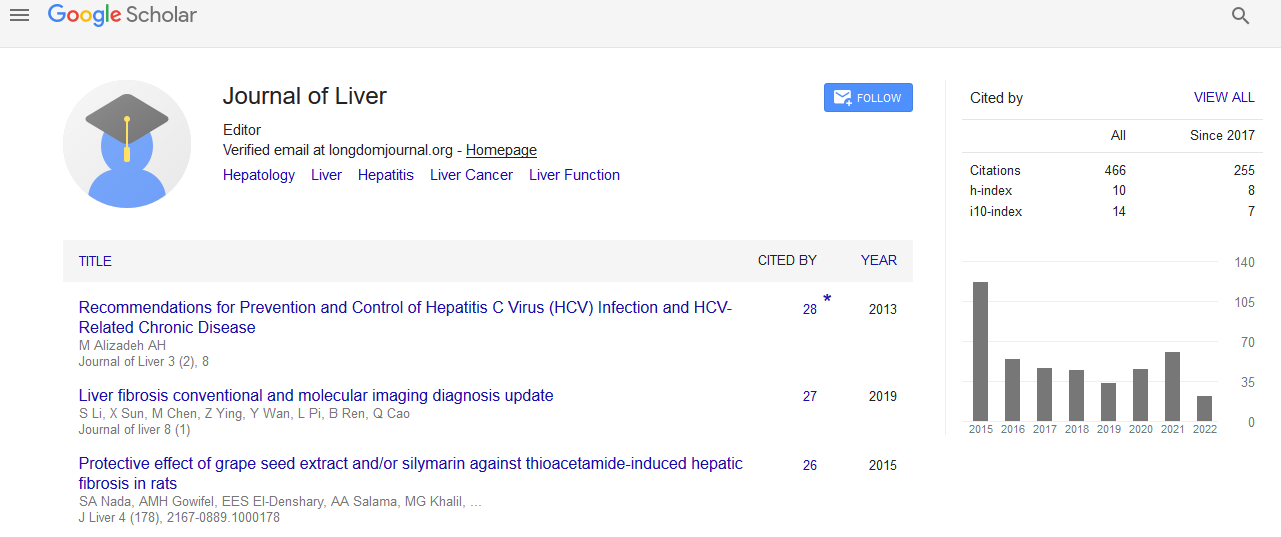PMC/PubMed Indexed Articles
Indexed In
- Open J Gate
- Genamics JournalSeek
- Academic Keys
- RefSeek
- Hamdard University
- EBSCO A-Z
- OCLC- WorldCat
- Publons
- Geneva Foundation for Medical Education and Research
- Google Scholar
Useful Links
Share This Page
Journal Flyer

Open Access Journals
- Agri and Aquaculture
- Biochemistry
- Bioinformatics & Systems Biology
- Business & Management
- Chemistry
- Clinical Sciences
- Engineering
- Food & Nutrition
- General Science
- Genetics & Molecular Biology
- Immunology & Microbiology
- Medical Sciences
- Neuroscience & Psychology
- Nursing & Health Care
- Pharmaceutical Sciences
Abstract
Fibroblast Growth Factor 19 Activates the Unfolded Protein Response and Mitogen-Activated Protein Kinase Phosphorylation in H-69 Cholangiocyte Cells
Hannan A Qureshi, Jeffrey A Pearl, Kristy A Anderson and Richard M Green
Objective: Cholangiocytes are injured in many cholestatic diseases that can progress to cirrhosis, liver cancer and need for liver transplantation. Recent studies demonstrate that the hormone Fibroblast Growth Factor 19 (FGF19) is produced in the ileum and regulates hepatic gene expression. However, the role of FGF19 in cholangiocytes remains largely unknown. The purpose of this study was to elucidate the effect of FGF19 on cholangiocyte gene and protein signaling.
Methods: Human cholangiocyte-derived H-69 cells were cultured and treated with varying concentrations of FGF19 (0–50 ng/ml) for 24 hours. Expression of the mitogen-activated protein kinase MAPK proteins JNK1/2, ERK1/2, and p38, and several Unfolder Protein Response (UPR) proteins were studied using Western blot analysis. Gene expression of UPR pathways was analyzed using real-time polymerase chain reaction (RT-PCR). Results: FGF19 treatment increased BiP and CHOP protein expression in a concentration-dependent manner. Gene expression of BiP increased from 1.02 ± 0.24 to 2.16 ± 0.62 (vehicle vs. FGF19 25 ng/ml, respectively. p<0.01) and CHOP expression increased from 1.05 ± 0.36 to 2.42 ± 0.56 (vehicle vs. FGF19 50 ng/ml, respectively, p ≤ 0.01). The UPR protein phosphorylated-eIF2α displayed a bimodal pattern of protein expression, with concentrations of 2.5-10 ng/ml of FGF19 maximally reducing expression and 50 ng/ml maximally increasing expression. Protein expression of phosphorylated JNK1/2, ERK1, and p38 also displayed a similar bimodal pattern of expression with a reduced expression at 2.5 ng/ml FGF19 and a return to baseline at 25 ng/ml.
Conclusion: These findings indicate that FGF19 treatment of H-69 cells selectively activates the UPR and MAPK pathways. We believe that FGF19 may have a role in the pathogenesis of human cholangiopathies.

